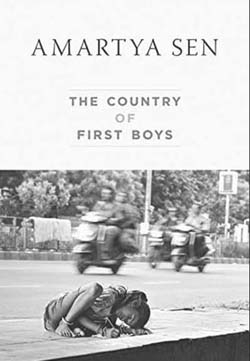This is a recent offering by Amartya Sen, who currently teaches economics and philosophy at Harvard University. He was earlier Master of Trinity College, Cambridge and is a Nobel prize winner.
The book contains 13 essays, selected and organized by the editors of The Little Magazine, (TLM) who have resisted the urge to make them ‘contemporary’. They are presented in a chronological manner, covering the broad fields of culture, society and policy. An intimately warm, yet gently provocative, foreword by Gopalkrishna Gandhi alerts the reader that the stylistic quirks of Sen, and his parenthesis laced phraseology is what distinguishes the academic from the magistrate and goes on to compare the essays to a Ragamalika composed by a master, of fragments borrowed from different ragas, set to various talas but strung together in a pleasant yet skilled miscellany of modes and moods, un-heavy without being light, informal without being casual, out not to ‘prove’ or establish a theory but only to ‘share’ perceptions.
The essays, sparkling with dry wit, can well be enjoyed for themselves. This is what Gopal Gandhi also experienced. Moreover, they were on occasion written to meet the ‘theme’ needs of a particular issue of the TLM with Sen taking the trouble to read through the offerings of other contributors in order to weave his thoughts ‘around’ to ensure a thematic fit. Sequenced chronologically in the book, they consequently also often, but understandably, have ‘repetitive’ ideations. The editors, in their preface, upfront equate the book to a time-lapse photograph, shot over 15 years.
A book of essays, published over the years, needs a context or, it might be said, a justification for compilation/ issue. Prelaunch write-ups/interviews by Sen had appeared in The New York Review of Books, Huffington Post and Hindustan Times and are worth a visit. This book was issued not to simply re-present old essays but to communicate distress. This review is accordingly structured to focus discussions on these perceptions.
In his quasi-autobiographical introduction, Sen talks of his early days, love for Sanskrit (revealing that while he was comfortable with the classical version, he could manage some Vedic and Epic Sanskrit as also Pali) and mathematics. It is articulated that his strong stance in favour of pluralism and social justice stems in the main from his youthful love for the classics, aroused and fermented under the guidance of his grandfather, his first ‘teacher’ and a Sanskrit scholar of repute, and brings out that the epics are not primarily religious texts adding that Sanskrit has a larger body of firmly agnostic and atheistic literature compared to any other classical language.
This familiarity with the classics comes out in the essay on Indian Calendars contributed to launch The Little Magazine. The importance of calendars, even in the most ancient times, and the near continuous inter-mixing and cross-learning of knowledge that was even then occurring/being experienced is portrayed. So also is depicted the concept that the idea of ‘India’ pre-dated Alexander and was written about by Apollonius (an early ‘India’ expert) and this naturally leads on to the admittedly short lived yet multicultural, experiments of Akbar in developing his calendar and religious system through ‘Tarikh-Ilahi’ and ‘Din-Ilahi’.
Continue reading this review

